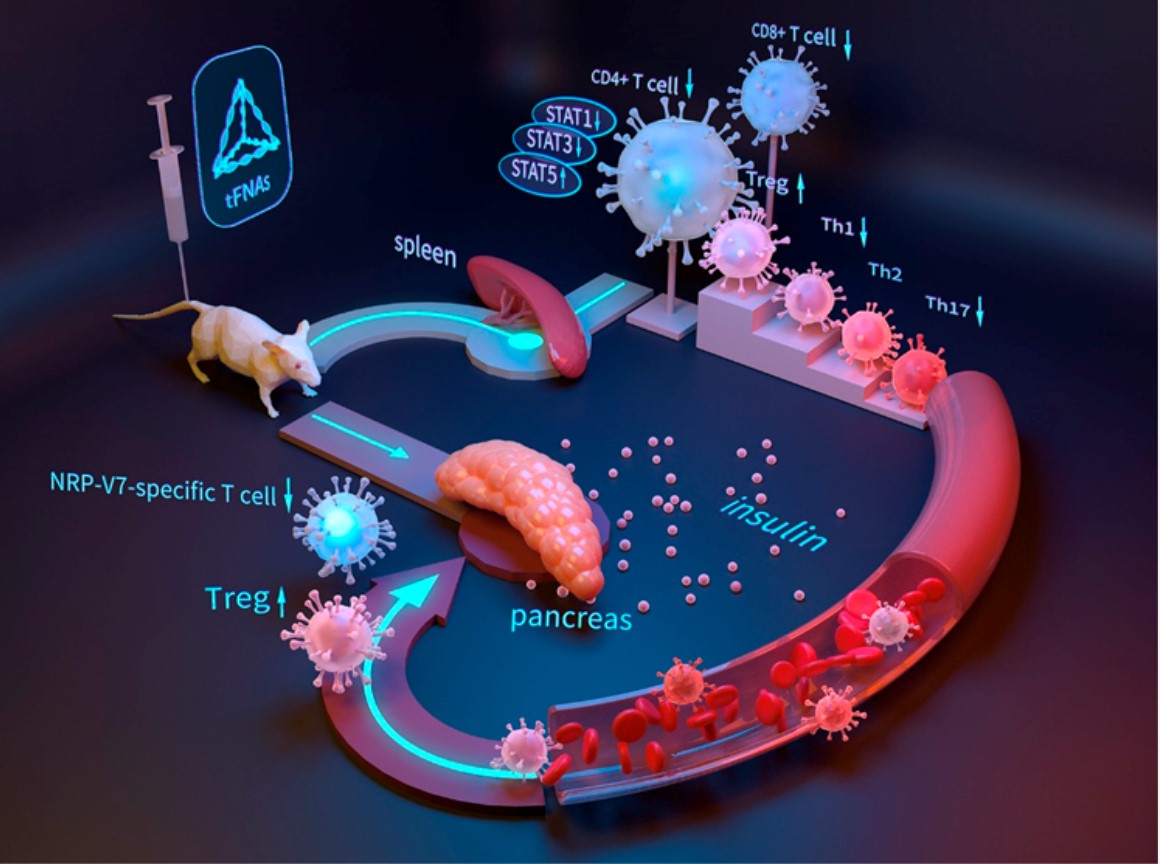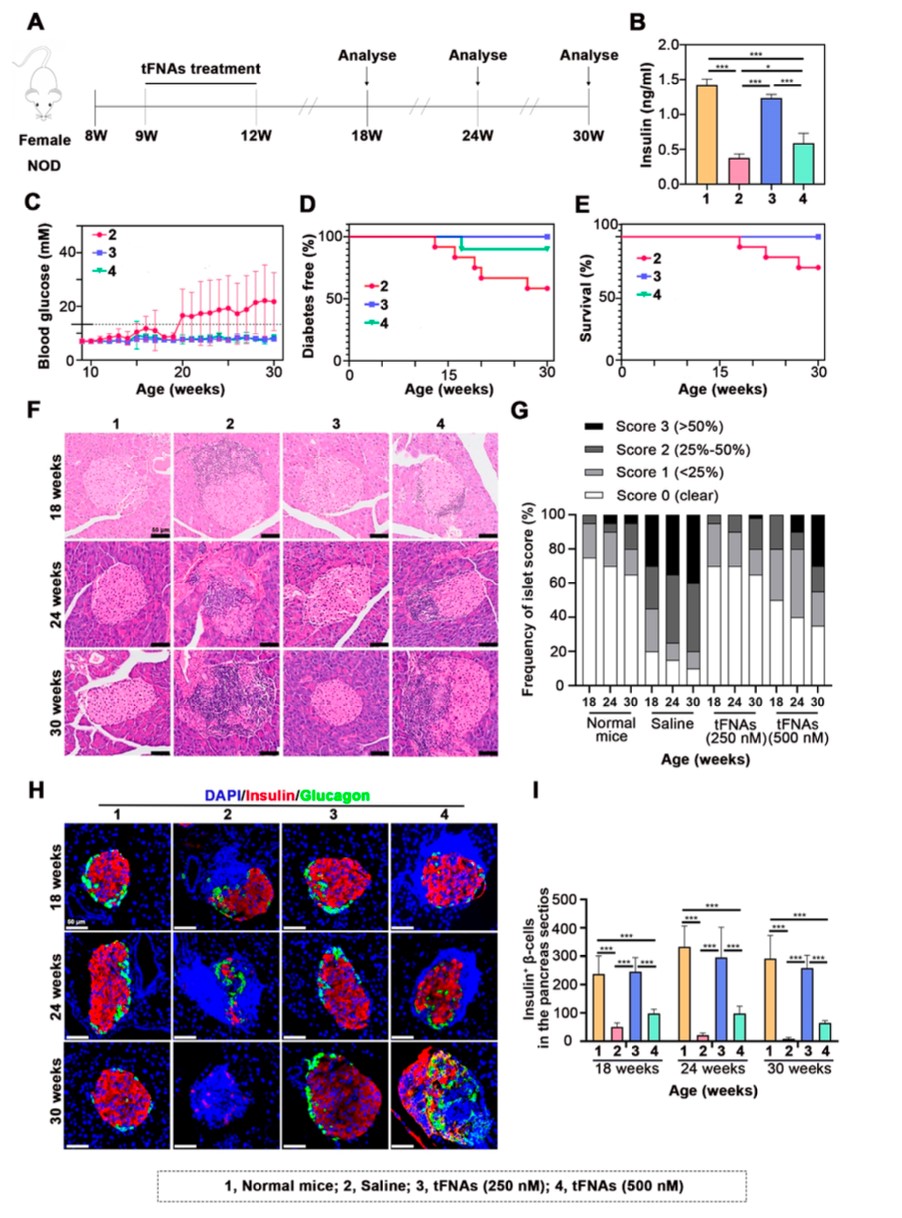Use of DNA tetrahedron in preparing medicine for preventing and treating type 1 diabetes
2024-06-26
Failure of immune tolerance leads to autoimmune destruction of insulin-producing β-cells, which in turn causes type 1 diabetes (T1D). Suppressing autoreactive T cells and inducing regulatory T cells (Tregs) to reestablish immune tolerance are promising approaches to prevent the onset of T1D. Here, we investigated the ability of tetrahedral framework nucleic acids (tFNAs) to induce immune tolerance and prevent T1D in nonobese diabetic (NOD) mice. In prediabetic NOD mice, tFNAs treatment resulted in normoglycemia and reduced the incidence of diabetes. Furthermore, tFNAs (250 nM) treatment preserved β-cell mass and function, increased the frequency of Tregs, and suppressed autoreactive T cells, leading to immune tolerance. Overall, our results suggest that tFNAs treatment aids in glycemic control, provides β-cell protection, and prevents the onset of T1D in NOD mice via immune modulation. These results highlight the potential of tFNAs in preventing autoimmune T1D.
Background:
In this study, we investigated the use of tetrahedral framework nucleic acids (tFNAs) in the prevention of type 1 diabetes (T1D). T1D is a serious autoimmune disease that affects millions of people worldwide, in which the immune system attacks pancreatic beta cells, resulting in impaired insulin production. Existing treatments such as insulin injections cannot cure the disease, and current vaccine development is still in its infancy. Therefore, the development of new therapeutic strategies, especially those that can modulate the immune system and restore immune tolerance, is of great significance for improving the treatment of T1D patients. This study demonstrates the potential of tFNAs in modulating immune responses and provides a new direction for the prevention and treatment of diabetes.
Cutting-edge scientific research results: This study demonstrates the potential of tFNAs in preventing T1D by increasing regulatory T cells (Tregs) and inhibiting autoreactive T cells, effectively maintaining pancreatic β-cell function and normal blood glucose levels.
This study found that tFNAs can induce immune tolerance in NOD mice, maintain normal blood sugar levels, and reduce the incidence of diabetes. tFNAs treatment can increase the frequency of regulatory T cells (Tregs) and inhibit autoreactive T cells, thereby protecting β cells and preventing the occurrence of T1D.
Experimental method:
In this study, we used non-obese diabetic (NOD) mice as an animal model of type 1 diabetes (T1D) and administered different concentrations of tetrahedral framework nucleic acids (tFNAs) to mice by tail vein injection to evaluate their preventive effect on the onset of T1D. The experimental design included monitoring the blood glucose levels of mice before and after treatment, using immunohistochemistry and flow cytometry to analyze cellular changes in the pancreatic islets and immune system of mice, especially the number and activity of regulatory T cells (Tregs) and autoreactive T cells. In addition, serum samples of mice were collected and analyzed regularly to detect biomarkers related to pancreatic β-cell function to comprehensively evaluate the immunomodulatory effects of tFNAs and their potential effects in preventing T1D. The combined use of these methods aims to gain a deeper understanding of how tFNAs prevent the development of diabetes through immunomodulatory mechanisms.
Experimental results:
In this study, the application of tFNAs showed significant therapeutic effects in the NOD mouse model. Experimental results showed that tFNAs-treated mice maintained normal blood sugar levels throughout the study period and had a significantly reduced incidence of diabetes compared with the control group. Immunohistochemistry and flow cytometry data revealed that tFNAs were able to significantly increase the proportion of regulatory T cells (Tregs) while inhibiting the activity of autoreactive T cells, a change that helps protect pancreatic β cells from immune attack. In addition, through regular examination of pancreatic islet tissue, we found that the quality and function of β cells in the tFNAs-treated group were preserved and improved. These results not only demonstrate the effectiveness of tFNAs in preventing T1D, but also highlight its potential as an immunomodulator in the treatment of autoimmune diseases.
Analysis conclusion:
FNAs provide a new therapeutic strategy for preventing autoimmune type 1 diabetes by modulating immune responses and inducing immune tolerance. These findings highlight the potential application of tFNAs in the prevention and treatment of autoimmune diseases.
Published: Nano Letters 2021, 21, 4437−4446. DOI: 10.1021/acs.nanolett.1c01131
![]() Tetrahedral Framework Nucleic Acids Induce Immune Tolerance and Prevent the Onset of Type 1 Diabetes
Tetrahedral Framework Nucleic Acids Induce Immune Tolerance and Prevent the Onset of Type 1 Diabetes




